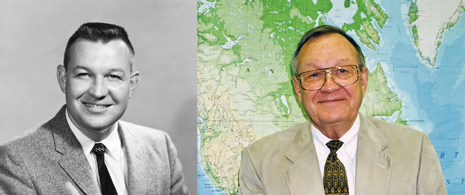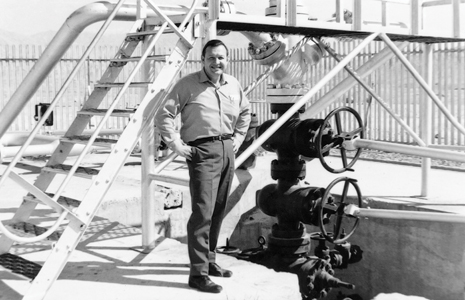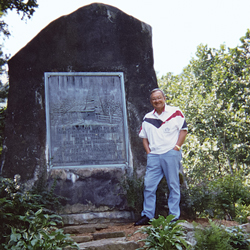Innovative thinkers
Bob Scott:
The art and science of oilfield storytelling
|
Bob Scott
After a 50-year career in the oil patch, Bob Scott, petroleum engineer, author of over 300 upstream articles and former president and CEO of Gulf Publishing, has no shortage of oilfield stories that you’d have to hear to believe. With a rare talent for writing about technical—and personal—experiences in the oil and gas world, Scott’s wit and deeply-rooted passion for oilfield culture has educated, entertained (and at times bewildered) readers from all over the world. From visiting a 100,000-bopd well in Iran and covering a blowout on Galveston Bay, to being the first to chronicle the Chinese oil industry post-WWII, Scott has witnessed the evolution of the oil business first-hand. His tales, recounted in this column, are based on discussions with him, as well as excerpts from his book Spouting Off, which chronicles his 30-year career in oilfield journalism. Scott received his petroleum engineering degree from the University of Texas in 1951, where he spent his summers working as a roustabout for Magnolia Petroleum. “I loved working in the oilfield, doing various chores related to drilling wells and building production facilities,” Scott said. Upon graduation, he joined Gulf Oil in Beaumont, Texas. He spent five years in the oil fields of South Louisiana working on well completions and designing production facilities. “The most memorable experiences were the hoorah going on. If you didn’t have a little fun working, you’d go nuts,” said Scott, who was known to be a prankster, himself, out in the field and in the office. Once, deciding to have a few slices from a fruitcake Christmas gift that a colleague had received, Scott, and a fellow engineer, re-packaged the “no-longer-intact” cake and placed it back where they found it. They then waited for the inevitable, surprised response from their victim about why a drilling contractor would send a gift of a half-eaten cake. That day never came and the duo soon found out why: their target, without checking the content of the cake box, had re-gifted the ‘unopened’ treat to his pastor. Through a serendipitous chain of events, an old friend of Scott’s, who worked as an engineering editor for World Oil at Gulf Publishing Company in Houston, called him to tell him he was leaving his position and to see if Scott was interested in taking over for him. While he had no formal writing experience, Scott decided to take a chance and joined Gulf in 1958. “Lawyers, economists and even geologists were prone to turn up their noses at any document written by an engineer, except maybe AFEs (authority for expenditure), which they couldn’t prepare,” Scott said. “No doubt, I was very lucky to be able to fake it for three decades, because my total writing experience prior to getting into the publishing game was comprised of AFEs,” he said. Scott began covering new production technologies and milestone projects in a variety of oil-producing regions, both in the U.S. and abroad in Europe, Africa and the Middle East. “I did endeavor to always put something on paper that I thought oilfield types would be interested in, be it humorous, serious, educational or whatever.” “What is fascinating is the range of opinion expressed about exactly the same editorial,” said Scott. In response to one of his articles, he received feedback that was, well, difficult to interpret as even being all related to the same piece of content. “I have seen all the articles I care to see from the liberal…often crude editorial director,” “Thanks for writing this,” “What the hell is the bottom line?,” “Cancel my subscription as long as he is editorial director,” “Best editorial,” and “Your column has deteriorated to…an irresponsible, selfish sounding board for your opinion of the Reagan administration…” were just a few examples. Scott was promoted to editor, effective with the June 1967 issue of World Oil, then to editorial director in 1984 for all of Gulf Publishing Company’s editorial products, and also to vice president in 1992. In 1977, he became the chairman of the Petroleum Production Division of the National Council for U.S.-China Trade and began researching the landscape of the Chinese oil industry—a topic that had not been publicly covered at length since before World War II. He led three delegations to the People’s Republic of China and, subsequently, published a seven-article, 46-page report chronicling the Chinese oil industry. The report established Scott as a subject matter authority on Chinese oilfield operations, and he received over 200 invitations to speak at a variety of oil industry organizations, including API, SPE, SEG and NOMADS, often received by eager audiences of 1,000 or more people. “Most of my best friends in the oil business were at service companies. They always knew more about what was going on in an area than any single person with an oil company. They were keeping up with everything,” Scott said. He also met a most unexpected person while, in 1978, in China—Bob Hope, who was filming a television show. Hope even included Scott and a colleague of his in a sketch. “Our sketch didn’t make it on air, but it was still fun. He was a really nice, normal, down-to-earth person” Scott said. Scott went on to author hundreds of articles, columns and handbooks on a barrage of topics, from oil production in the Santa Barbara Channel, to oilfield operations in Saudi Arabia. While his technical pieces gained acclaim all over the world and established him as a technical authority, it was his columns—filled with humorous quips about day-to-day oilfield fallacies—that made him a renowned character in the business. From his “You Know You’re a Real Native of the Oil Patch if” list, to his oilfield stories about bad days, oil patch advice, terminology updates, nostalgic recollections and travel commentary, Scott has prided himself in being a storyteller for one of the most unique industry cultures on the planet. While he wrote most of his stories under his own name, he wrote several articles as a ghost writer, and even drafted some that he only shared with friends, including his story, “Deer Hunting” about an eight-point buck that, after being hit by a rental car piloted by one of his engineering editors, “came back to life” in the truck of said car. In reminiscing about his early days working in the fields for Gulf Oil, Scott said, “Of course you’d better have had fun, considering the lousy pay, 7-day work weeks and 12–24-hr workdays. Today it’s pretty certain that there’s not near as much room left for fun things,” Scott said. “And that is a most regrettable loss we’ll likely never see regained.” In 1994, Scott became the chairman of the board, president and CEO of Gulf Publishing. From 1996 forward, he retained the chairman and CEO titles until his retirement in 1998. “It’s been a real elevator ride. Interestingly enough, I enjoyed being an editor much more than I did being in management,” he said. Throughout his 50-year career, Scott has witnessed—and covered—the greatest industry advances, from the growth of offshore drilling, to the evolution of hydraulic fracturing as a common practice, to the giant technological advances in exploration technology. And he knows that business will always be rooted in rapid change and advancement. Since publishing his memoirs and excerpts in Spouting Off in 2002, Scott has stayed active in several industry organizations, including being a 54-year member of SPE. He currently serves as the historian of POPS (Pioneer Oil Producers Society) and two Pioneer selection committees of the Offshore Energy Center. Scott, who recently celebrated his 60-year wedding anniversary with his wife Rose, best explains his career in the last lines of his book’s prologue. “Having the opportunity to travel to so many fascinating places around the world, and meeting and becoming friends with so many equally fascinating oilfield folks, and then sitting down and transferring all of those experiences to paper, was just as much fun as work. Indeed many times, it was more fun than work,” Scott said. “It can’t get much better than that.”
|
- Prices and governmental policies combine to stymie Canadian upstream growth (February 2024)
- U.S. producing gas wells increase despite low prices (February 2024)
- U.S. drilling: More of the same expected (February 2024)
- U.S. oil and natural gas production hits record highs (February 2024)
- U.S. upstream muddles along, with an eye toward 2024 (September 2023)
- Canada's upstream soldiers on despite governmental interference (September 2023)





